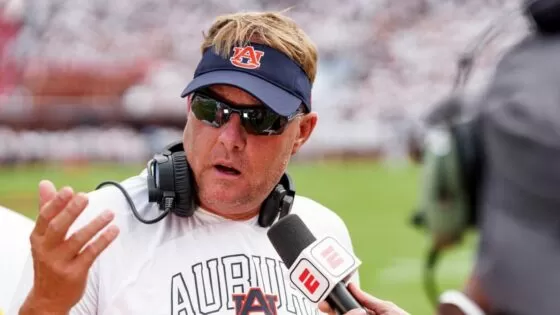NIL, or Name, Image, and Likeness, has been a hot topic in the world of college football recently. This new rule allows college athletes to profit off of their name, image, and likeness, something that was previously not allowed. While many see this as a positive change for the athletes, it has also sparked controversy and criticism from coaches such as Dabo Swinney, Lane Kiffin, Nick Saban, Jim Harbaugh, and Billy Napier.
Dabo Swinney, the head coach of the Clemson Tigers, has been one of the most vocal critics of NIL. In a recent interview, Swinney called it a “train wreck” and expressed his concerns about the impact it will have on college football. He believes that NIL will create an uneven playing field and make it harder for smaller schools to compete with the bigger, more financially stable programs.
Lane Kiffin, the head coach of the Ole Miss Rebels, went even further in his criticism, calling NIL “legalized cheating.” He believes that this new rule will only benefit the top players and programs, leaving the smaller schools and players behind. Kiffin also expressed concerns about the potential for boosters to use NIL as a way to influence recruits to choose their school.
Even the legendary Nick Saban, head coach of the Alabama Crimson Tide, has weighed in on NIL. Saban warned that this new rule is edging towards pure pay-for-play, which goes against the principles of amateurism that college sports have been built on. He believes that this will create a “slippery slope” and could lead to even more issues in the future.
Jim Harbaugh, the head coach of the Michigan Wolverines, and Billy Napier, the head coach of the Louisiana Ragin’ Cajuns, are known for their emphasis on values and character over money. However, even they have admitted that NIL has made it more challenging to keep their rosters intact. With players now able to profit off of their name, image, and likeness, it may be harder for coaches to keep their players focused on the team and not on individual gain.
But amidst all the criticism and concerns, there is one coach who has a different perspective on NIL – Hugh Freeze. Freeze, the head coach of the Liberty Flames, has been through his fair share of struggles in the world of college football. In a recent interview, he opened up about the mental struggles he faced during his time as the head coach of Auburn, which almost led him to quit his job.
Freeze revealed that the pressure to win and the constant scrutiny from the media and fans took a toll on his mental health. He also shared that he had to take medication to deal with the anxiety and depression that came with the job. However, he believes that NIL could have helped him during that time. He stated that if he had the opportunity to profit off of his name, image, and likeness, he could have used that money to hire a mental health professional to help him cope with the stress and pressure.
Freeze’s perspective on NIL is refreshing and highlights the potential benefits of this new rule. While there are valid concerns about the impact it may have on college football, it is essential to remember that this rule is ultimately about giving athletes the opportunity to benefit from their hard work and talent. It is a step towards recognizing their value and allowing them to have control over their own brand.
Moreover, NIL can also be a valuable tool for athletes to prepare for life after college sports. Many of these players will not go on to have professional careers, and NIL can provide them with a way to build their personal brand and create opportunities for themselves. It also teaches them important skills such as financial management and marketing, which will be beneficial in their future endeavors.
In conclusion, while there may be differing opinions on NIL, it is clear that it has flipped college football on its head. It has sparked important conversations about the future of college sports and the well-being of the athletes. And while there may be challenges and adjustments that need to be made, it is ultimately a positive change that will benefit the players and the sport as a whole. As Hugh Freeze said, “It’s a new world, and we have to adjust to it.”

